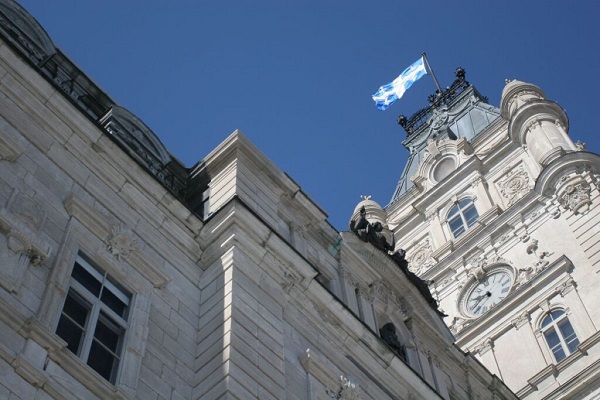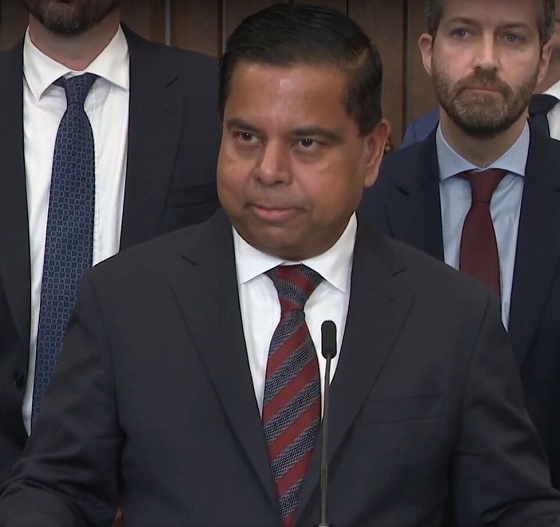Justice
Quebec teacher challenges Education Minister’s gender transition policy

From the Justice Centre for Constitutional Freedoms
The administrators notified the teacher that if she disclosed any information about the child’s in-school gender transition during that spring interview, the teacher would be fired immediately.
MONTREAL, QC: The Justice Centre for Constitutional Freedoms announces the launch of a constitutional challenge in Quebec’s Superior Court against the Ministry of Education. This action is brought on behalf of a teacher who refused to lie to the parents of a 14-year-old student seeking a female-to-male gender transition, as her school administration had ordered her to do.
Following directives in the Education Minister’s Guide and Procedures on trans and non-binary persons’ gender identity, the student’s Montreal high school created a set of procedures to make it illegal to inform parents (or guardians) when their child seeks a gender transition.
At the beginning of October 2023, school administrators advised teachers that they should designate the 14-year-old student with the masculine pronouns “he/him” in class. But when dealing with the student’s parents, teachers were ordered to use the student’s given name and feminine pronouns. They gave this order even though there was no evidence or suspicion of parental abuse.
The teacher informed the administration that while she agreed to observe the student’s pronoun preferences, the teacher objected to the requirement that she lie to parents about their child’s gender change, especially during an upcoming parent/teacher interview.
That interview did not occur. Instead, the school allowed the teacher to submit a written report to the student, copied to the parents, which avoided the use of pronouns. While granting this exception, the school made it clear that the teacher would be obligated to meet with the parents during a parent/teacher interview scheduled for the spring if the parents requested such interview. The administrators notified the teacher that if she disclosed any information about the child’s in-school gender transition during that spring interview, the teacher would be fired immediately.
At that point, the teacher, assisted by the Justice Centre, filed the constitutional challenge to nullify the Minister of Education’s Guide and Procedures because, notably, they “contravene parental rights protected by section 7 of the Canadian Charter of Rights and Freedoms…in defiance of the principles of fundamental justice and without sufficient justification in a free and democratic society.” The teacher also believes that the Guide and Procedures violate the teacher’s section 2 Charter right to freedom of conscience.
Having to lie to her pupil’s parents was the last straw for the plaintiff teacher. “I couldn’t live with myself if I did that,” the teacher stated. “I won’t look them in the eye and intentionally lie about the fact that we are enabling their child to undergo a significant psychosocial intervention without their knowledge.”
According to the teacher’s lawyer, Olivier Séguin, this would be the first time that a court action raised freedom of conscience without also raising freedom of religion. Section 2(a) of the Charter guarantees both freedom of conscience and religion.
“It’s true that the prohibition on lying is common to all religions, but my client’s conscientious objection is not religious in nature,” Mr. Séguin explains.
The teacher went on to say, “Transparent collaboration with parents is essential to my role as a teacher and critical for the long-term wellbeing of children. Lying to parents about how we are treating their children, or about what is going on with children at school, violates the principles of my vocation.”
While it is true that the law does not expressly mention how schools should handle cases like this one, Mr. Séguin says, the Guide’s authors appear to have issued a ministerial directive on the sly, through a “guidance” intended for schools, in which they make the law say things it simply does not say.
For example, in its section entitled “Legal framework” (page 8), the Guide cites section 60 of the Civil Code of Quebec, which states that a request for a name change may be made on the initiative of a minor aged 14 or over, but the Guide ignores section 62, located right next to it, which states that parents must be notified of the request for a change of name and that they are permitted to object.
The Guide’s authors also cite article 71 of the same Civil Code, which also says, like Section 60, a request for a change of gender may be made on the initiative of a minor aged 14 or over. But again, the authors of the Guide fail to note Article 73, which states that parents must be able to object to any such change.
Mr. Séguin does not consider Minister of Education Bernard Drainville responsible for the omissions. The Quebec newspaper Le Devoir had already pointed out that by opposing mixed-sex toilets in schools, he had placed himself in contradiction with “the recommendations of his own ministry,” i.e. the recommendations set out in the Guide.
In the same article, Le Devoir reported that the Guide was the result of collaboration between (1) the Ministry of Justice and (2) the Ministry of Family, (3) the Office Against Homophobia and Transphobia, (4) the Research Chair in Sexual Diversity and Gender Plurality, Université du Québec à Montréal, and (5) the National Table Against Homophobia & Transphobia in Education Networks.
Mr. Séguin says he doesn’t believe the omissions are unintended incompetence, stating, “The irregularities with which the Guide is riddled are both too obvious and too numerous to see anything other than a desire to mislead readers by falsely claiming to translate the letter of the law. I see it as a form of usurpation of power, a denial of democracy.”
As for his client’s position, he says, “Secrecy towards parents, which in practice amounts to lying to them, is a serious violation of the legal contract that binds the state and its citizens.”
Censorship Industrial Complex
Legal warning sent to Ontario school board for suspending elected school council member

The Justice Centre for Constitutional Freedoms announces that a legal warning letter has been sent to the Hamilton-Wentworth District School Board after it suspended a parent from her role on the School Council for respectfully objecting to land acknowledgements.
Catherine Kronas, a concerned parent with a child enrolled at Ancaster High Secondary School, was re-elected to serve on School Council in October 2024.
During a Council meeting on April 9, 2025, Ms. Kronas asked that her respectful objection to land acknowledgements be noted in the minutes. No disruption occurred; her comments were limited to requesting that her dissenting viewpoint be recorded.
On May 22, 2025, however, the School Board informed Ms. Kronas that her involvement on the Council was being “paused” based on allegations that she had caused harm and had violated a Code of Conduct Policy. She has not been permitted to attend the next scheduled meeting.
Ms. Kronas was unsettled by the Board’s decision, saying, “I was taken aback by the Board’s decision to suspend me from the School Council after delivering a respectful objection, especially given assurances made at a previous council meeting and outlined in the Council bylaws that open dialogue and diverse perspectives are welcomed.”
“By barring me from the next meeting, the Council sends a troubling message to all parents: that even respectful disagreement may be met not with dialogue, but with disciplinary action. I am grateful to the Justice Centre for Constitutional Freedoms for assisting me in this matter,” she remarked.
Constitutional lawyer Hatim Kheir said Ms. Kronas’ comments “were a reasonable and measured expression of a viewpoint held by many Canadians.”
“The Board’s decision to suspend her from the Council, which she has a right to sit on as an elected parent member, is an act of censorship that offends the right to freedom of expression,” he explained.
Mr. Kheir is calling for Ms. Kronas to be immediately reinstated to the Council and to be allowed to fulfill her elected role without further retaliation for expressing her views.
To view a brief video summary of this matter, click here.
To receive regular updates from the Justice Centre, click on this link to join our email list.
Alberta
Red Deer Justice Centre Grand Opening: Building access to justice for Albertans

The new Red Deer Justice Centre will help Albertans resolve their legal matters faster.
Albertans deserve to have access to a fair, accessible and transparent justice system. Modernizing Alberta’s courthouse infrastructure will help make sure Alberta’s justice system runs efficiently and meets the needs of the province’s growing population.
Alberta’s government has invested $191 million to build the new Red Deer Justice Centre, increasing the number of courtrooms from eight to 12, allowing more cases to be heard at one time.
“Modern, accessible courthouses and streamlined services not only strengthen our justice
system – they build safer, stronger communities across the province. Investing in the new Red Deer Justice Centre is vital to helping our justice system operate more efficiently, and will give people in Red Deer and across central Alberta better access to justice.”

Government of Alberta and Judiciary representatives with special guests at the Red Deer Justice Centre plaque unveiling event April 22, 2025.
On March 3, all court services in Red Deer began operating out of the new justice centre. The new justice centre has 12 courtrooms fully built and equipped with video-conference equipment to allow witnesses to attend remotely if they cannot travel, and vulnerable witnesses to testify from outside the courtroom.
The new justice centre also has spaces for people taking alternative approaches to the traditional courtroom trial process, with the three new suites for judicial dispute resolution services, a specific suite for other dispute resolution services, such as family mediation and civil mediation, and a new Indigenous courtroom with dedicated venting for smudging purposes.
“We are very excited about this new courthouse for central Alberta. Investing in the places where people seek justice shows respect for the rights of all Albertans. The Red Deer Justice Centre fills a significant infrastructure need for this rapidly growing part of the province. It is also an important symbol of the rule of law, meaning that none of us are above the law, and there is an independent judiciary to decide disputes. This is essential for a healthy functioning democracy.”
“Public safety and access to justice go hand in hand. With this investment in the new Red Deer Justice Centre, Alberta’s government is ensuring that communities are safer, legal matters are resolved more efficiently and all Albertans get the support they need.”
“This state-of-the-art facility will serve the people of Red Deer and surrounding communities for generations. Our team at Infrastructure is incredibly proud of the work done to plan, design and build this project. I want to thank everyone, at all levels, who helped make this project a reality.”
Budget 2025 is meeting the challenge faced by Alberta with continued investments in education and health, lower taxes for families and a focus on the economy.

Quick facts
- The new Red Deer Justice Centre is 312,000 sq ft (29,000 m2). (The old courthouse is 98,780 sq ft (9,177 m2)).
- The approved project funding for the Red Deer Justice Centre is about $191 million.
-

 Health2 hours ago
Health2 hours agoLast day and last chance to win this dream home! Support the 2025 Red Deer Hospital Lottery before midnight!
-

 Business23 hours ago
Business23 hours agoCarney’s European pivot could quietly reshape Canada’s sovereignty
-

 Alberta23 hours ago
Alberta23 hours agoAlberta’s grand bargain with Canada includes a new pipeline to Prince Rupert
-

 Aristotle Foundation5 hours ago
Aristotle Foundation5 hours agoThe Canadian Medical Association’s inexplicable stance on pediatric gender medicine
-

 Crime1 day ago
Crime1 day agoManhunt on for suspect in shooting deaths of Minnesota House speaker, husband
-

 conflict9 hours ago
conflict9 hours ago“Evacuate”: Netanyahu Warns Tehran as Israel Expands Strikes on Iran’s Military Command
-

 Energy8 hours ago
Energy8 hours agoCould the G7 Summit in Alberta be a historic moment for Canadian energy?
-

 Bruce Dowbiggin8 hours ago
Bruce Dowbiggin8 hours agoWOKE NBA Stars Seems Natural For CDN Advertisers. Why Won’t They Bite?





